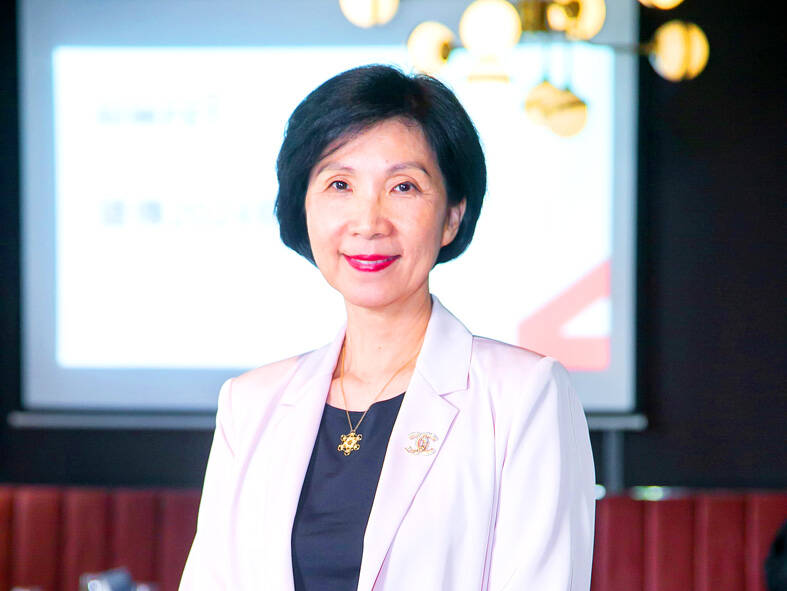Far EasTone Telecommunications Co (遠傳電信) yesterday said it aims to turn around its earnings next year and hopes to report healthy double-digit percentage growth in 2026, aided by its acquisition of Asia Pacific Telecom Co (亞太電信).
The telecom’s earnings per share fell 4.1 percent to NT$0.81 in the first three months of this year, compared with NT$0.85 in the same period last year, diluted by an increase of 9.6 percent in capital shares.
However, net profit increased 6.1 percent year-on-year to NT$2.92 billion (US$90.18 million) from NT$2.75 billion, surpassing the company’s forecast of NT$2.8 billion per quarter.

Photo courtesy of Far EasTone Telecommunications Co via CNA
“We hope to make a turnaround in the second year [of the Asia Pacific Telecom acquisition]. For the third year, we hope to return to our previous growth path of double-digit percentage growth,” Far EasTone president Chee Ching (井琪) told reporters in Taipei. “Earnings in 2026 will exceed that of last year.”
Far EasTone formally acquired Asia Pacific Telecom on Dec. 15 last year. The acquisition helped boost Far EasTone’s mobile subscriber base to 9.08 million users at the end of last year from 7.22 million in the third quarter of last year.
However, the acquisition was a drag on its average revenue per unit (ARPU) in the initial phase.
Far EasTone’s ARPU fell to NT$695 last quarter, from NT$746 in the fourth quarter of last year, as a bulk of Asia Pacific Telecom’s users are low-tariff subscribers.
“We expect to see significant incremental growth in ARPU,” Ching said, citing the company’s three-year business plan implemented following the absorption of the smaller telecom.
“We will offer more value-added services, including new artificial intelligence applications, to drive ARPU. We already have some on offer and will have much more this year and next year in collaboration with start-up partners,” she said.
Far EasTone has already shown some positive signs of growth, as about 70 percent of Asia Pacific Telecom users signed up for higher-tariff subscriptions when they switched to Far EasTone, the company said.
Far EasTone expects its 5G penetration to climb to about 45 percent this year, compared with 37 percent at the end of last year together with Asia Pacific Telecom.
Far EasTone said it expects 20 percent of its total revenue to come from non-traditional telecom services, a similar portion to last year.
Revenue this year is expected to increase 12 percent annually from NT$93.69 billion last year, it said.
The telecom said the acquisition would help save operational expenses from the second half of this year, following the integration of its base stations with those of Asia Pacific Telecom.
Capital expenditure would fall to NT$7.3 billion this year from NT$8.1 billion last year, it added.

NEW IDENTITY: Known for its software, India has expanded into hardware, with its semiconductor industry growing from US$38bn in 2023 to US$45bn to US$50bn India on Saturday inaugurated its first semiconductor assembly and test facility, a milestone in the government’s push to reduce dependence on foreign chipmakers and stake a claim in a sector dominated by China. Indian Prime Minister Narendra Modi opened US firm Micron Technology Inc’s semiconductor assembly, test and packaging unit in his home state of Gujarat, hailing the “dawn of a new era” for India’s technology ambitions. “When young Indians look back in the future, they will see this decade as the turning point in our tech future,” Modi told the event, which was broadcast on his YouTube channel. The plant would convert

‘SEISMIC SHIFT’: The researcher forecast there would be about 1.1 billion mobile shipments this year, down from 1.26 billion the prior year and erasing years of gains The global smartphone market is expected to contract 12.9 percent this year due to the unprecedented memorychip shortage, marking “a crisis like no other,” researcher International Data Corp (IDC) said. The new forecast, a dramatic revision down from earlier estimates, gives the latest accounting of the ongoing memory crunch that is affecting every corner of the electronics industry. The demand for advanced memory to power artificial intelligence (AI) tasks has drained global supply until well into next year and jeopardizes the business model of many smartphone makers. IDC forecast about 1.1 billion mobile shipments this year, down from 1.26 billion the prior

People stand in a Pokemon store in Tokyo on Thursday. One of the world highest-grossing franchises is celebrated its 30th anniversary yesterday.

Zimbabwe’s ban on raw lithium exports is forcing Chinese miners to rethink their strategy, speeding up plans to process the metal locally instead of shipping it to China’s vast rechargeable battery industry. The country is Africa’s largest lithium producer and has one of the world’s largest reserves, according to the US Geological Survey (USGS). Zimbabwe already banned the export of lithium ore in 2022 and last year announced it would halt exports of lithium concentrates from January next year. However, on Wednesday it imposed the ban with immediate effect, leaving unclear what the lithium mining sector would do in the